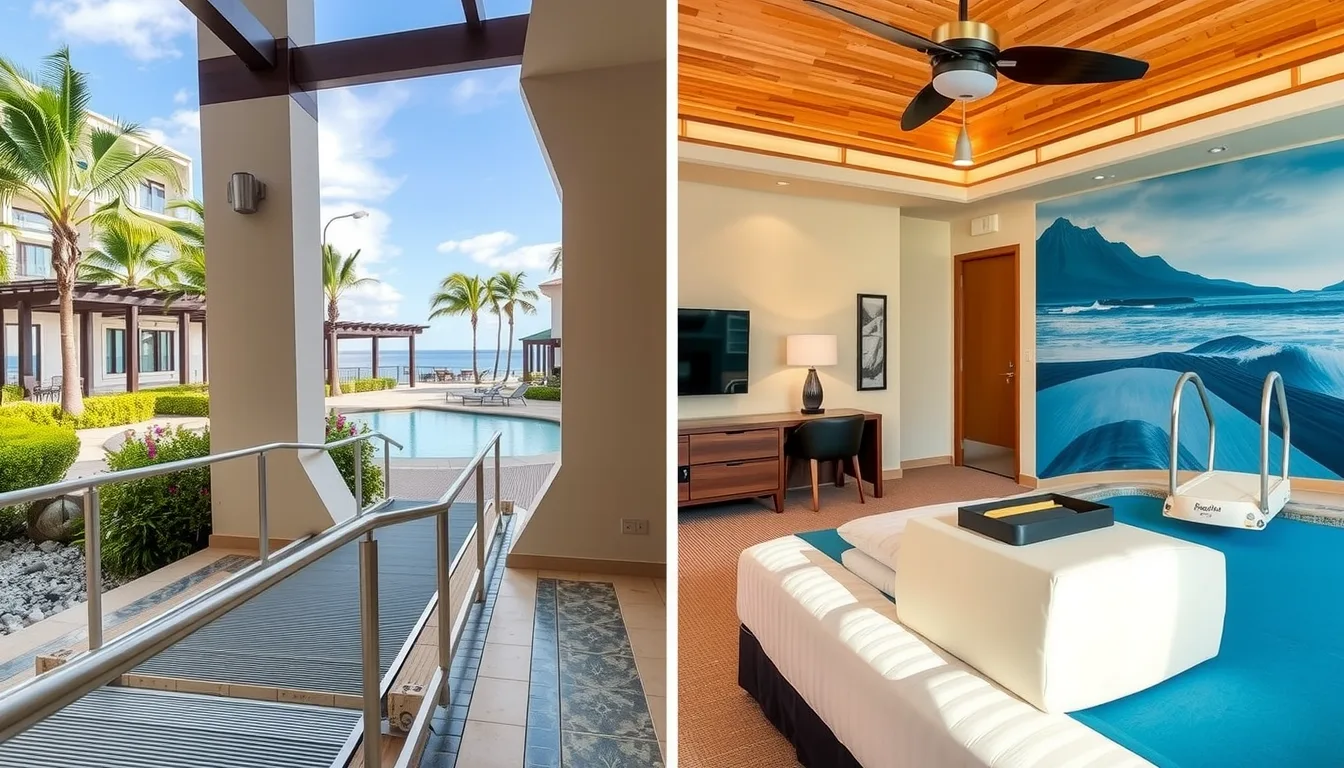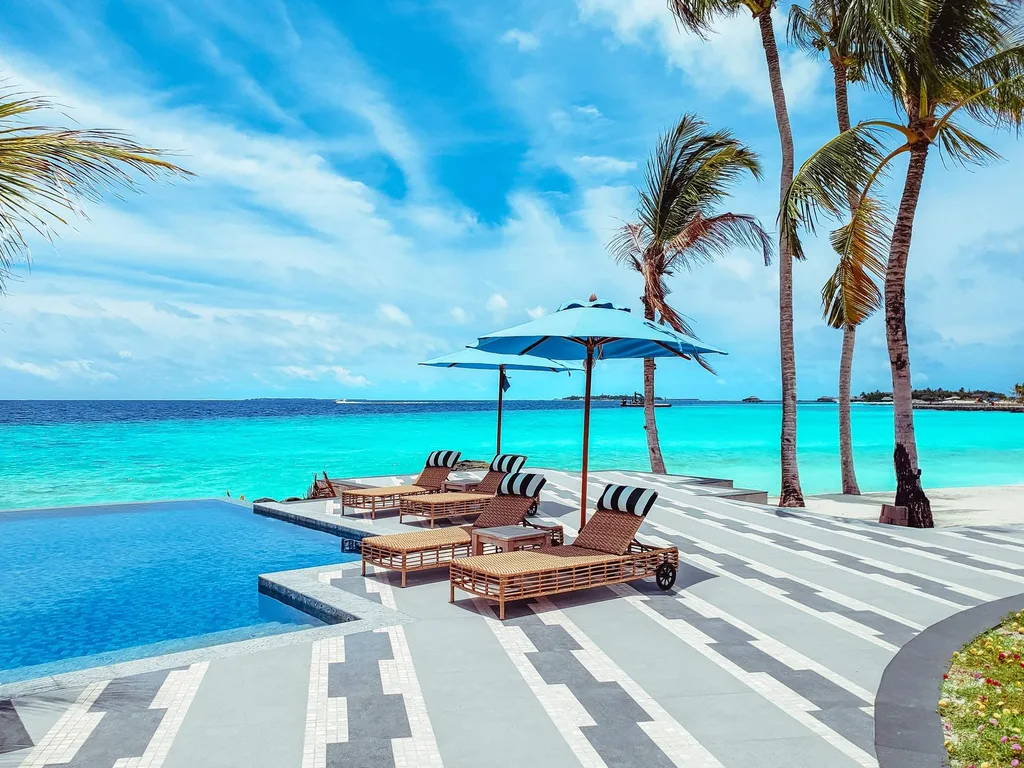Resorts promise luxury, adventure, and relaxation—but for travelers with disabilities, those promises often fall short.
Accessibility gaps can turn a dream vacation into a frustrating experience.
From transportation to dining, every detail matters when planning an inclusive resort stay.
Even well-intentioned resorts may overlook critical accommodations, leaving guests excluded.
This guide reveals seven warning signs that your resort may not be truly accessible—and shows you how to book with confidence.
Travel should be empowering, not exhausting.
1. Understand Why Accessibility Travel Shapes Every Resort Experience
When planning a resort vacation, accessibility might not be the first thing on your mind, especially if you don’t face mobility challenges.
However, for those with disabilities, the resort’s approach to accessibility travel can make or break the experience.
It’s essential for travelers to know that not all resorts are created equal when it comes to disability accommodations.
Resorts that prioritize accessibility can provide a seamless and enjoyable experience, ensuring that guests with disabilities can enjoy all the amenities, activities, and services available.
Inclusive travel means ensuring that every guest, regardless of ability, can access everything the resort has to offer—from rooms to pools, from restaurants to excursions.
It involves thoughtful planning and intentional design to eliminate barriers, making the resort environment welcoming and enjoyable for all guests.
In a world that is slowly becoming more aware of accessibility, resorts that offer inclusive travel do not only comply with legal requirements but also actively improve the guest experience for individuals with mobility, sensory, and cognitive disabilities.
These efforts demonstrate a commitment to making travel an equitable experience for everyone.
2. Choose the Right Resort to Unlock True Accessibility
The first step in ensuring a fully accessible resort experience is to carefully choose a destination that prioritizes disability accommodations.
Resort destinations are making progress in becoming more accessible, but it’s essential to do some research to find one that suits your specific needs.
Look for Certified Accessible Resorts
Some resorts are recognized for their accessibility standards, including those that meet requirements set by organizations such as the Americans with Disabilities Act (ADA) in the United States or similar certifications in other countries.
Resorts with these certifications are more likely to offer comprehensive disability accommodations such as:
- Wheelchair-accessible rooms: Designed with wider doorways, lowered beds, and easy-to-use amenities.
- Accessible bathroom facilities: Featuring roll-in showers, grab bars, and spacious layouts.
- Ramp access and elevators: Ensuring all areas of the resort are navigable for people with mobility challenges.
Make sure to research whether the resort you choose has certifications such as ADA-compliant or similar, as this often guarantees a higher level of accessibility across all services.
A certified accessible resort typically adheres to the highest accessibility standards, which can be crucial for a comfortable stay.
Review Resort Websites for Detailed Accessibility Information
Resorts often advertise inclusive travel and disability accommodations on their websites.
Look for clear and comprehensive information regarding the accessibility of guest rooms, public spaces, and available amenities.
The more detailed the information, the better the resort is likely to be in providing a truly inclusive experience.
Some key areas to check include:
- Room descriptions: Ensure that the resort offers rooms with features like wider doors, roll-in showers, grab bars, and accessible beds.
- Public spaces: Verify that the resort has ramps, elevators, and accessible routes to restaurants, lounges, pools, and other communal areas.
- Swimming pools and beaches: Some resorts offer wheelchair-accessible pools, beach wheelchairs, and beach mats to help individuals with limited mobility enjoy the sand and water.
If the resort’s website doesn’t provide sufficient accessibility information, don’t hesitate to contact the resort directly for clarification.
A resort that is committed to accessibility will be happy to provide thorough details about their disability accommodations.
Contact the Resort Directly
While resort websites often provide information about disability accommodations, it’s always best to contact the resort directly.
This allows you to clarify any concerns, ask specific questions about accessibility, and confirm that your needs will be met.
Some questions you might want to ask include:
- Do you have wheelchair-friendly rooms with roll-in showers?
- Are there accessible transportation options to and from the resort?
- Are there any special services or amenities for individuals with hearing, vision, or mobility impairments?
Resort staff who are familiar with the needs of accessibility travel will be happy to assist and ensure your stay is comfortable.
3. Confirm Essential Accessibility Features That Make Rooms Barrier‑Free
Once you’ve selected the right resort, it’s crucial to ensure that the room and accommodations you book are fully accessible.
When it comes to disability accommodations, resorts should meet specific standards to ensure you can enjoy your stay without barriers.
Here’s a list of the key accessibility features you should look for in resort accommodations:
Wheelchair-Accessible Rooms
For individuals using a wheelchair or mobility device, accessible rooms should be a priority.
Wheelchair-accessible rooms should include:
- Wide doorways: Ensure that the doors are wide enough for a wheelchair or walker to pass through easily.
- Lowered furniture: Desks, countertops, and beds should be at a height that is comfortable for someone in a wheelchair.
- Sufficient floor space: The room should have enough space for maneuvering a wheelchair or scooter freely, including around the bed, bathroom, and furniture.
Accessible Bathrooms
Accessible bathrooms are an essential feature of disability accommodations.
Look for the following:
- Roll-in showers: These allow a wheelchair user to shower independently without having to transfer to a traditional shower seat.
- Grab bars: Ensure that there are grab bars near the toilet and in the shower for stability.
- Raised toilet seats: These can be helpful for individuals with limited strength or mobility.
- Larger shower space: There should be ample space for maneuvering a wheelchair in the shower, along with non-slip floors to prevent accidents.
Elevators and Ramps
When booking accommodations, check that the resort has elevators or ramps to allow easy access to all floors, especially if you are staying on an upper level.
There should be no barriers, like stairs, that prevent access to key areas of the resort.
Additionally, if the resort features any outdoor areas or pools, ensure that there are ramps leading to those spaces as well.
Accessible resorts prioritize these features to ensure that everyone can move freely within the premises.
4. Ensure Resort Amenities and Activities Stay Fully Accessible
Resorts typically offer a range of activities and amenities designed to enhance the vacation experience.
For inclusive travel, it’s important to make sure these offerings are accessible.
Here’s how resorts can adapt common activities for individuals with disabilities:
Pools and Hot Tubs
For many travelers, the resort pool is an essential part of the vacation experience.
Many resorts now offer accessible pools with specialized equipment such as:
- Pool lifts: These lifts help individuals who have limited mobility safely enter and exit the pool.
- Beach wheelchairs: For resorts located near the beach, some offer beach wheelchairs that allow individuals to roll onto the sand and into the water.
- Zero-entry pools: These pools have no steps, allowing individuals to walk or roll directly into the water from the shallow end.
These features ensure that everyone can enjoy a refreshing swim without the need for transfers or complex procedures, providing a stress-free experience.
Spas and Wellness Centers
Many resorts include spas and wellness centers, which can be an excellent source of relaxation.
When choosing a resort with a spa, consider the following:
- Massage tables: Resorts with accessible spas offer tables that accommodate those in wheelchairs or with mobility challenges.
- Accessible wellness programs: Check if the spa or resort offers special programs or treatments tailored for people with disabilities, such as adaptive yoga or water aerobics.
Wellness is a crucial part of a resort vacation, and ensuring that it is accessible can significantly enhance the experience for individuals with mobility challenges.
Dining and Restaurants
Dining should be an accessible and inclusive experience.
Some resorts now offer accessible restaurants with tables that are wheelchair-friendly.
Ensure that:
- Accessible seating is available, such as tables that allow for a comfortable dining experience for those in wheelchairs.
- Menus in braille or with other accessibility features are available for guests with vision impairments.
- Staff training: Ensure that the restaurant staff is trained to cater to guests with dietary needs or mobility challenges.
Accessible dining ensures that everyone can enjoy a delicious meal in a relaxed environment, without barriers or complications.
5. Secure Accessible Transportation That Supports Your Resort Stay
Accessibility isn’t just limited to the resort itself; it’s also crucial to consider the transportation options you’ll need to get to and from the resort.
Here are several aspects to consider when ensuring your accessibility travel needs are met during the transportation process:
Accessible Transportation to the Resort
Check that the resort provides accessible transportation, including:
- Wheelchair-accessible shuttles or taxis that are equipped with lifts for mobility devices.
- Private transportation: If you’re traveling with a mobility device, you may want to inquire about private transfers that can accommodate your needs.
- Public transportation: In areas where public transportation is available, ensure that buses or trains are accessible, with features like ramps, lowered floors, or designated seating for individuals with disabilities.
The resort should offer reliable options for getting around, whether it’s from the airport, train station, or bus terminal.
Resort Parking
When arriving at the resort, ensure that there are designated accessible parking spots that are close to the entrance.
This reduces the amount of walking required, especially if you have mobility limitations.
Accessible parking should have ample space around the vehicle to allow for easy access to the car and entryway.
6. Expect Customer Service That Delivers True Accessibility Support
An often-overlooked part of inclusive travel is the resort’s customer service.
Resort staff play a crucial role in ensuring that every guest has a positive experience.
When booking a resort, ensure that the staff is trained to provide disability accommodations and knows how to assist guests with accessibility needs.
Communicating Accessibility Needs
Once you’ve booked your stay, don’t hesitate to communicate your accessibility requirements to the resort in advance.
The more information you can provide, the more prepared the resort will be to meet your needs.
If you require specific services, such as wheelchair assistance, dietary restrictions, or access to specific areas, ensure that the staff is informed beforehand.
This will help the resort prepare accommodations and services that will suit you and make your stay easier.
On-Site Assistance
Resorts with inclusive travel policies often provide on-site assistance to help with day-to-day needs.
Ensure that the resort offers 24/7 customer service that is trained to assist with any issues related to accessibility.
This may include helping with room adjustments, coordinating accessible transport, or assisting with reservations for accessible activities.
The staff should be approachable, knowledgeable, and ready to help whenever necessary.
A resort committed to accessibility will provide not just physical accommodations but also excellent customer service to ensure your needs are met.
7. Maximize Your Resort Vacation with Inclusive, Accessible Experiences
Ensuring that your resort stay is fully accessible means not just focusing on the logistics, but also on the overall experience.
Here’s how you can make the most out of your inclusive travel experience:
Take Advantage of Resort Activities
Once you’ve ensured that all disability accommodations are in place, dive into the activities your resort offers.
Many resorts now provide inclusive activities such as:
- Adaptive sports programs: Resorts with inclusive travel policies may offer specialized programs for individuals with disabilities, such as wheelchair-accessible water sports or adaptive ski programs.
- Cultural and recreational activities: Participate in local tours, performances, or cooking classes designed to be accessible for everyone.
Whether you’re interested in trying new sports, exploring the local culture, or relaxing by the pool, ensure that you have a range of accessible options available to enhance your vacation experience.
Plan for Flexibility and Relaxation
While accessibility is important, it’s equally crucial to plan time for relaxation.
Choose activities that match your pace, and ensure that your trip has enough downtime so you’re not overwhelmed by a packed schedule.
Resorts that focus on inclusive travel often offer flexible itineraries, allowing you to enjoy your vacation at your own speed.
Book an Accessible Resort That Supports Your Travel Needs
With the right planning and a little research, accessibility travel can be an enjoyable and stress-free experience for anyone with mobility challenges or other disabilities.
Resorts are increasingly adopting inclusive practices, from accessible rooms and bathrooms to specialized services and amenities.
By choosing the right resort, ensuring all necessary disability accommodations are in place, and taking advantage of accessible activities, you can enjoy your vacation without the barriers that once made travel difficult.
Whether you’re seeking relaxation, adventure, or culture, accessible resorts provide a seamless way to experience the world with ease and confidence.
FAQ – Spot Resort Accessibility Gaps Before You Book
What accessibility features should I confirm before booking a resort?
Wheelchair-accessible rooms must include wide doorways, lowered furniture, and ample maneuvering space.
Bathrooms should offer roll-in showers, grab bars, and raised toilet seats to support independent use.
Elevators and ramps must connect all public areas, including pools, restaurants, and outdoor spaces.
These features unlock a barrier-free experience and ensure your resort stay is truly inclusive.How can I verify a resort’s disability accommodations before arrival?
Start by reviewing the resort’s website for detailed accessibility information.
Look for room descriptions, public space layouts, and amenity access that match your mobility needs.
Contact the resort directly to confirm features like roll-in showers, accessible transport, and staff training.
This proactive approach streamlines your planning and prevents last-minute surprises.What questions should I ask the resort to confirm accessibility?
Ask whether they offer wheelchair-friendly rooms with roll-in showers and grab bars.
Confirm if accessible transportation is available to and from the resort.
Inquire about services for guests with hearing, vision, or cognitive impairments.
These questions help you unlock clarity and ensure your needs are fully supported.Are resort amenities like pools and spas typically accessible?
Many resorts now offer pool lifts, beach wheelchairs, and zero-entry pools for easy access.
Spas may include massage tables designed for mobility devices and adaptive wellness programs.
Accessible amenities enhance relaxation and ensure every guest can participate fully.What role does customer service play in accessibility travel?
Trained staff can assist with room adjustments, activity reservations, and transportation coordination.
Communicating your needs in advance helps the resort prepare and personalize your experience.
Supportive customer service transforms accessibility from a checklist into a seamless journey.How can I make the most of my accessible resort vacation?
Explore adaptive sports, cultural tours, and inclusive activities tailored to your pace.
Plan for flexibility by balancing scheduled events with downtime and relaxation.
Accessible resorts empower you to travel with confidence and enjoy every moment.








